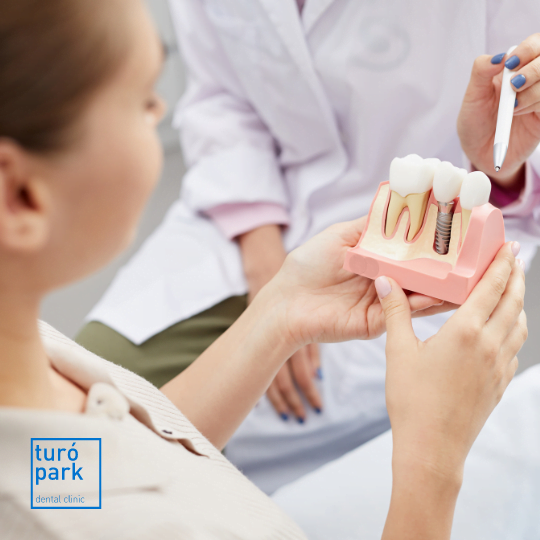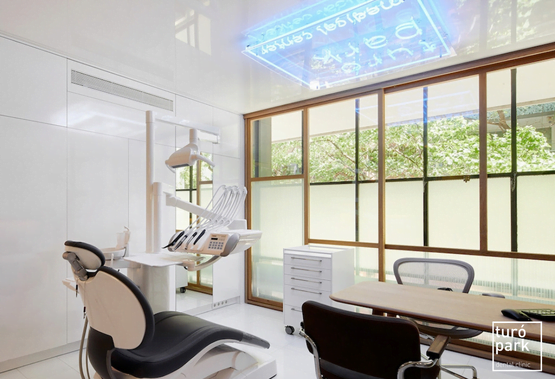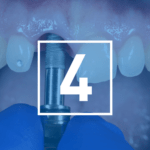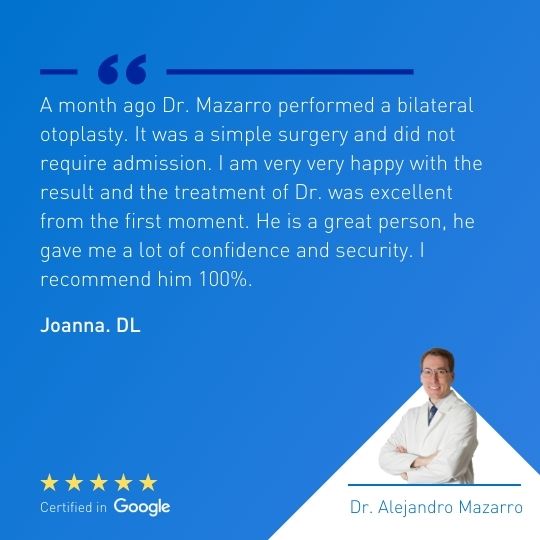Thinking about getting dental implants in Barcelona?
Turó Park Clinics offers you high-quality, affordable and comfortable dental implants in the heart of Barcelona.
There are several replacement options for missing teeth, but dental implants are by far the most comfortable and long-lasting treatment. By choosing Turó Park Clinics in Barcelona for your dental implants, you are choosing affordable, dental care by experts in the field, completed in the upmost comfort, with the most innovative dental technologies.
What are dental implants?
A dental implant is an artificial tooth and tooth root used to replace one or more missing teeth. Dentists use a titanium screw to secure the artificial tooth (also known as a fixed dental prosthesis) to either the upper or lower jaw bone. In the past, the only option for people missing teeth were either gaps in their mouth, dentures, or dental bridges.
It is also possible to place several dental implants in order to attach a complete dental prosthesis and thus replace all the teeth in an arch.
Fast track your treatment
To book an appointment or speak with one of our friendly team, please get in touch using the options below

Why get a dental implant?
Most people choose dental implants because they want to improve their physical appearance. However, having missing teeth also increases your risk of tooth decay or movement of adjacent teeth. With missing teeth, it can be more difficult to effectively chew your food.
Dental implants help ensure better nutrition, a balanced diet, healthy digestion and better oral health.
What are the advantages of implant?
There are several solutions for replacing a missing tooth, but dental implants are by far the most innovative and effective technique. From an aesthetic point of view, it cannot be compared with other methods, such as dentures or bridges. The latter has a disadvantage that does not exist in implantology.
With a bridge, two mechanical wings are attached to the teeth adjacent to the missing tooth to hold the false tooth. And sometimes these healthy teeth have to be mutilated to serve as abutments. This is not the case if implant-supported prostheses are used. Finally, it is important to remember the particularly high success rate of implantology, which is over 90%.
Get your smile back!
Our specialists in implantology offer you treatments adapted to your needs and your budget!

Dental implants in Barcelona: procedure

Step 1: implantology consultation
Firstly, all implant treatment begins with a thorough examination of the patient's mouth to determine the advantages and feasibility of implant placement. At this stage, a radiological assessment is essential to evaluate the available bone volume. A CT scan is sometimes necessary. These elements are necessary to determine the treatment plan and thus avoid possible complications.

Step 2: implant placement
Secondly, under local anaesthetic, the surgeon first exposes the jawbone by making an incision in the gum where the dental implant will be placed. The surgeon then drills a hole in the jawbone using surgical instruments, while taking care not to reach nearby anatomical structures, such as certain nerves and the maxillary sinuses. The dental implant is then screwed in place so that it is aligned with the bone below the gum line.

Step 3: healing
Next, a delay is then observed to allow the implant to integrate well with the bone. This is called osseointegration. This stage can last from 3 to 9 months.

Step 4: placing of the abutment
When the surgeon confirms that the osseointegration of the implant with the bone has occurred correctly and that the tissues are completely healed, an abutment, which will later accommodate the crown, prosthesis or artificial bridge, is screwed onto each dental implant installed in the previous step; the surgeon must first remove the gum tissue that covers the implant.

Step 5: placement of the final prosthesis
Lastly, once the abutment is placed, the implants will be put into function: crowns or bridges will be placed on the implants to complete the rehabilitation process.
Once the trials have been completed and if the work meets the patient's expectations (in terms of comfort, chewing ability, colour or shape of the tooth), the final fitting takes place: the practitioner glues or screws in the fixed prosthesis and the work is completed.
Why get a dental implant at Turó Park Clinics?
Turó Park Clinics' dentists and oral surgeons are experts in their field, with years of specialized training and clinical experience with implant placement. Our specialists use Cone Beam Dental Scanning, a specialized type of Xray, to produce 3-dimensional images of your teeth, bones, nerves and soft tissues of the mouth. Using this advanced technology increases precision, safety, and the likelihood of treatment success.
Turó Park Clinics' professionals primarily work only with zirconium dental crowns. This type of crown is the most desirable material because it is most easily shaped, sized, and colored to match natural teeth.
Dental implants are performed during regular business hours in our centrally-located Barcelona clinic, which allows patients who do not live in Barcelona to make the round trip on the same day. Appointments can be booked online, consultations are readily available, and the Turó Park Clinics team is always available to answer any questions you may have during the entire process.
Turó Park Clinics can offer you dental implant procedures with improved pain control and reduced anxiety, if you struggle with fear related to dental procedures. Conscious sedation uses short-acting medications to help you relax (a sedative) and to relieve any pain (an anesthetic).
You will remain conscious during the procedure, but because you are more relaxed, the surgeon is able to work more quickly and effectively, usually shortening the total time of the procedure.
Our English-speaking dentists specialized in implantology




Our doctor's reviews


Our answers to the most frequently asked questions about dental implants
How long does a dental implant last?
Can a dental implant become infected?
What to eat after dental implants?
Dental societies and organisations










Have a look to the financing options
Don't worry, we take care of everything!